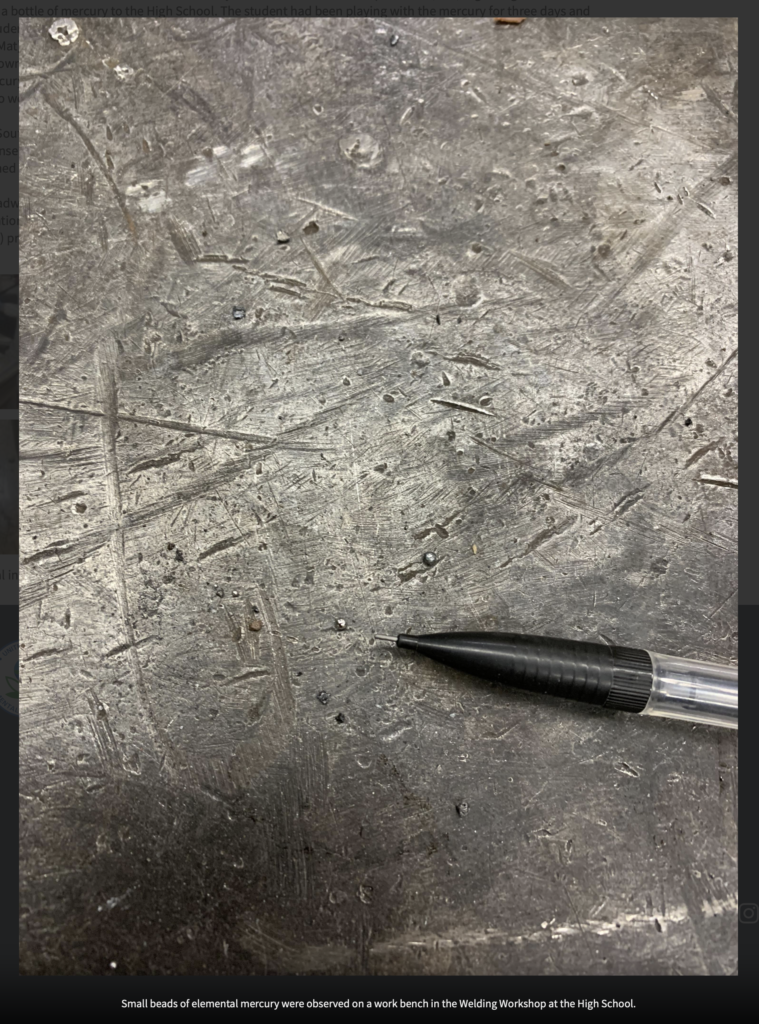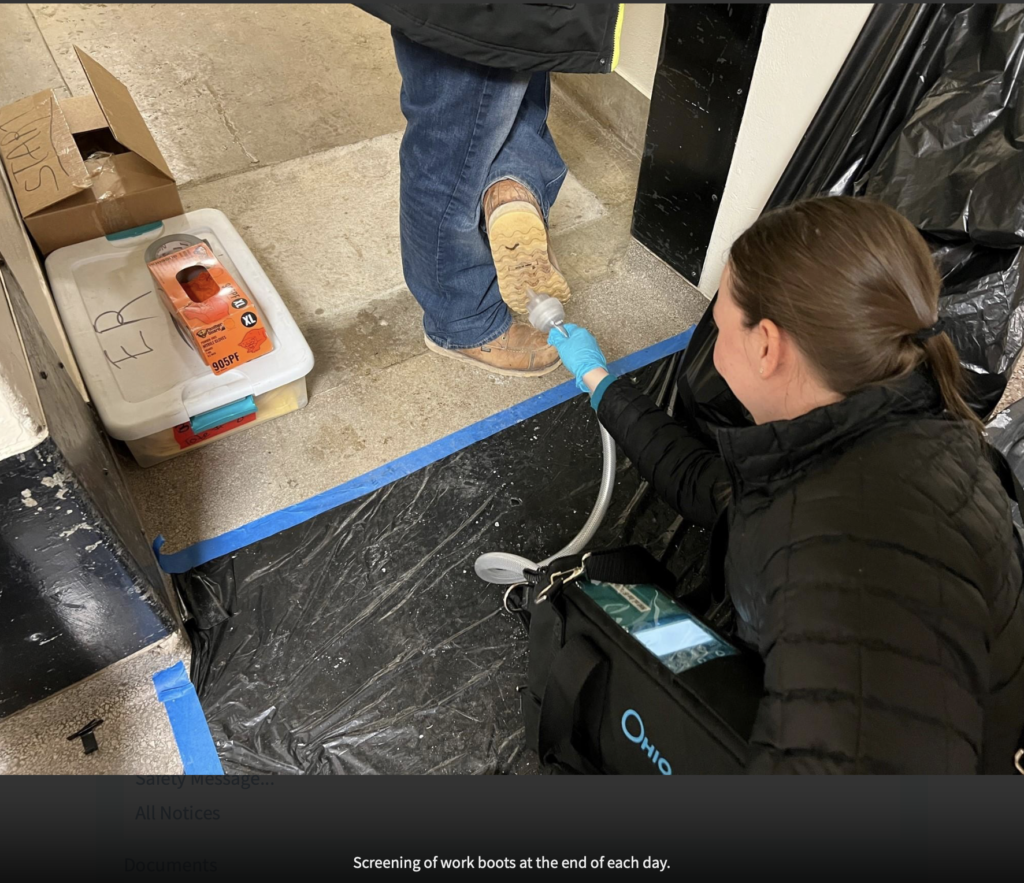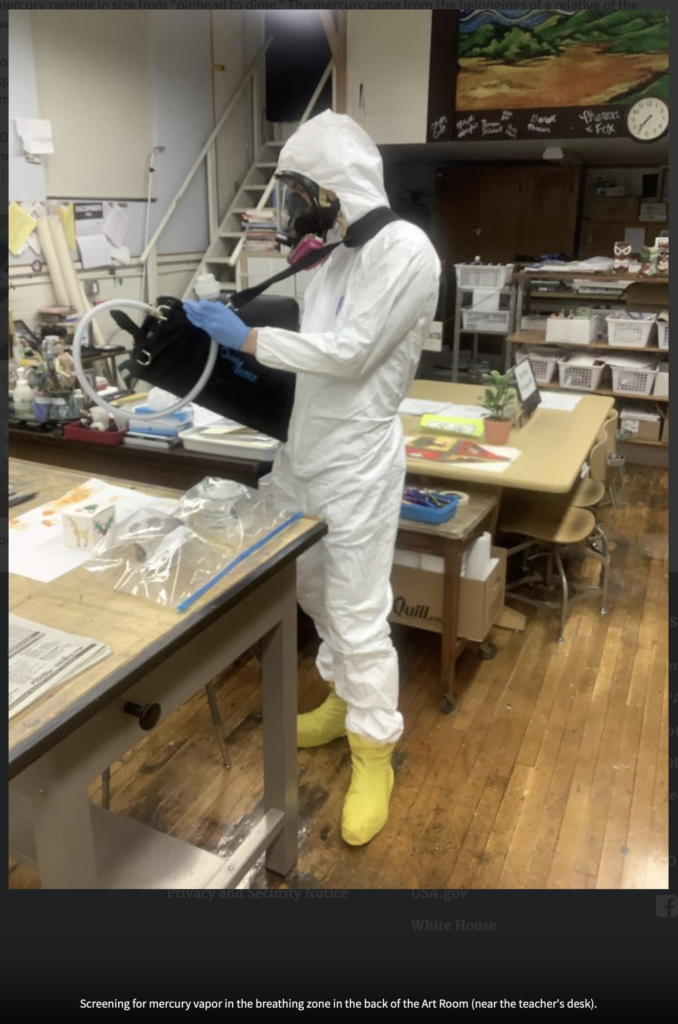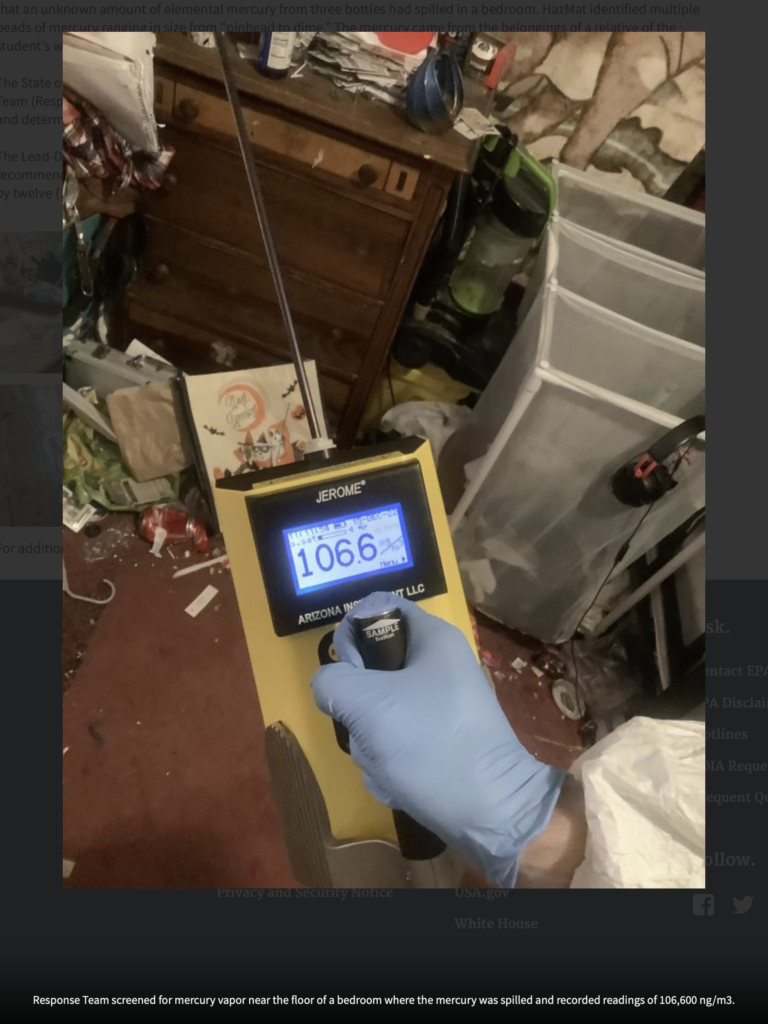Lead-Deadwood High School students got three extra days of Christmas break last week thanks to mercury, a knucklehead, and the EPA:
Dr. Erik Person, superintendent of the school district, said a high school student brought a quantity of elemental mercury to school from home, not realizing that it is a hazardous material.
…The student had found the mercury in his attic and had been playing with it at home for several days before taking it to school.
Person said that fortunately, due to the blizzard and school closure Tuesday through Friday, Dec. 12 was the only day students were in school and district officials and the EPA took time to deal with the situation appropriately.
…EPA officials called Person at 5 p.m. Sunday saying they were not yet comfortable with the mercury levels in every room and the decision was made to close the high school building for school Monday, although the middle and elementary schools were in session [Jaci Conrad Pearson, “Mercury Incident Prompts L-D School Closure,” Black Hills Pioneer, 2022.12.19].




The student’s family also got a search, seizure, and scrubbing from the Rapid City hazardous materials team:
Percy also said the student who brought it to school also told her he had, “quite a bit of mercury at his house, in his bedroom, and it was all over. So I contacted the fire department in Rapid City and they had the haz mat team come up to the student’s house that day and kind of decontaminate the student’s bedroom” [Conrad Pearson, 2022.12.19].
The EPA says the RC HazMat team found three bottle of mercury spilled in the student’s bedroom, with beads of the toxic liquid “ranging in size from ‘pinhead to dime’.” The mercury came from “the belongings of a relative of the student’s who worked at a mine.” The EPA is offering free mercury screenings to area residents concerned their kids may have brought home some mercury; they have screened 12 homes so far in addition to the home where the mercury originated.
I remember 7th grade physical science class, circa 1965, our science teacher brought mercury to school and allowed us to let the stuff roll around on our desks and allowed us to try to pick it up with our fingers. Frustrating, to say the least. I know of none of us suffering ill effects.
Mercury occurs naturally throughout the Black Hills (not to mention from out of state coal fired power plants and even from wildfires) so if EPA and the Forest Service don’t stop Canadian miners from exposing more of it to the environment more fish will spread it to humans.
It appears the hazmat team should have been called for cleanup of the students bedroom long before the spilled mercury.
“not realizing that it is a hazardous material” – that screams volumes about the state of the South Dakota education system.
Jesus, Mary and Joseph. I’d be looking at blood levels, hair samples, etc., of that kid and his family, and maybe the kids and teachers in the classrooms where he spilled this stuff. I know it wasn’t taken that seriously back in my school days, where there was mercury in science classrooms, but mercury is dangerous stuff. It was used in mining and went into Whitewood Creek, creating a Superfund site.
Gee I remember not having a seatbelt to wear, a baby seat to use, a skiing helmet? Yeah right! A respirator, what’s that nonsense!! I guess I have a few friends that didn’t make it …. But I’m still here!
e platypus onion. Our Science teacher in Highmore did the same. We rolled it in our hands. Remember it well.
Ahhhh, yas. Ninth grade science – “Fun With Mercury, Our Roly-Poly Pal.” Yikes. At least we were admonished not to swallow any of it.
This explains much about Lead.
If memory serves, we also tore apart zinc canning lids and tied to burn them or something.
Yes, making dimes and quarters very shiny, remember it well. Wouldn’t want to guess how many various and sundry chemicals we spilled and inhaled goofing around when I was a kid. Is sulpher dangerous??? Remember shoveling up a wheel barrel full from a spill along the railroad track. It sat in a pile in a field behind the house for thirty years…not much grew around it.
Looks like a real project for the EPA would be to de-clutter the entire high-school. The fire marshals, who are not to be trifled with, will also now probably descend in a masked-mob to do a whole ‘nother kind of probing. Next thing you know, they’re going to have to knock the whole school down and buy a new one at taxpayer expense.
BB Fairbanks- while jumping my pickup this morning, I read a sticker under the hood warning vehicle operators not to drink/swallow battery acid. Good to know. My old 1980 Nissan King Cab had belt routing diagrams posted for reference instead.
Mark Anderson I remember the Highmore science teacher doing the same thing in the 1972-73 school year. If I remember correctly there was a heavy duty plastic jar, probably less than a pint, of the stuff in the chemical closet in the chemistry lab. There was also a jar of pure lithium and the teacher dropped a very small portion of the pure lithium in a beaker of water and we watched it violently react (explode).
Peppers like sulfur. Onions must like it as well. I have ammonium sulfate, 21% nitrogen and 24% sulfur. It is sold as onion fertilizer and works quite well when onions start bulbing out.
@MFI – Does it make your onions extra pungeant?
They are, but it might be due to other factors. I buy them through my neighbor from Dixondale Farms out of Texas. They are strong smelling but mild tasting.
I live in Lead. The house in question is basically being gutted by the Feds. If you saw what they have hauled out of that house is more then a bedroom. Moral of the story, don’t play with large quantities of mercury in your home. The family won’t have much left if they even have a house when the EPA is finished.
The EPA goons are very punitive.
The EPA is never punitive enough in red states.
Whadda ‘ya mean, goons? What a simple mind that never gets exercised or exposed to normal life.
Chemical spills are quite com on, more so than you’d think…..
from the Guardian….https://www.theguardian.com/us-news/2023/feb/25/revealed-us-chemical-accidents-one-every-two-days-average
Residents f East Palestine Ohio are being diagnosed with bronchitis from easily preventable chem spilll.. We know why the spill happened and the blame lays at the stinky feet of magats.
https://www.nbcnews.com/health/health-news/ohio-derailment-chemicals-people-diagnosed-bronchitis-rcna71839
Yes, all kinds of very dangerous, lethal, chemicals travel by rail. Tanker cars have been improved but many tankers of the old design stay in service. While the newer tankers have “safety systems” which are better than the old tankers, they still can leak or be split open in high speed derailments such as we saw at East Palestine. Eroded railbeds and split rails, among other issues, are often the cause of derailment as well as collisions with trucks and automobiles. A train is actually a huge machine with thousands of moving parts, all of which can and do fail.